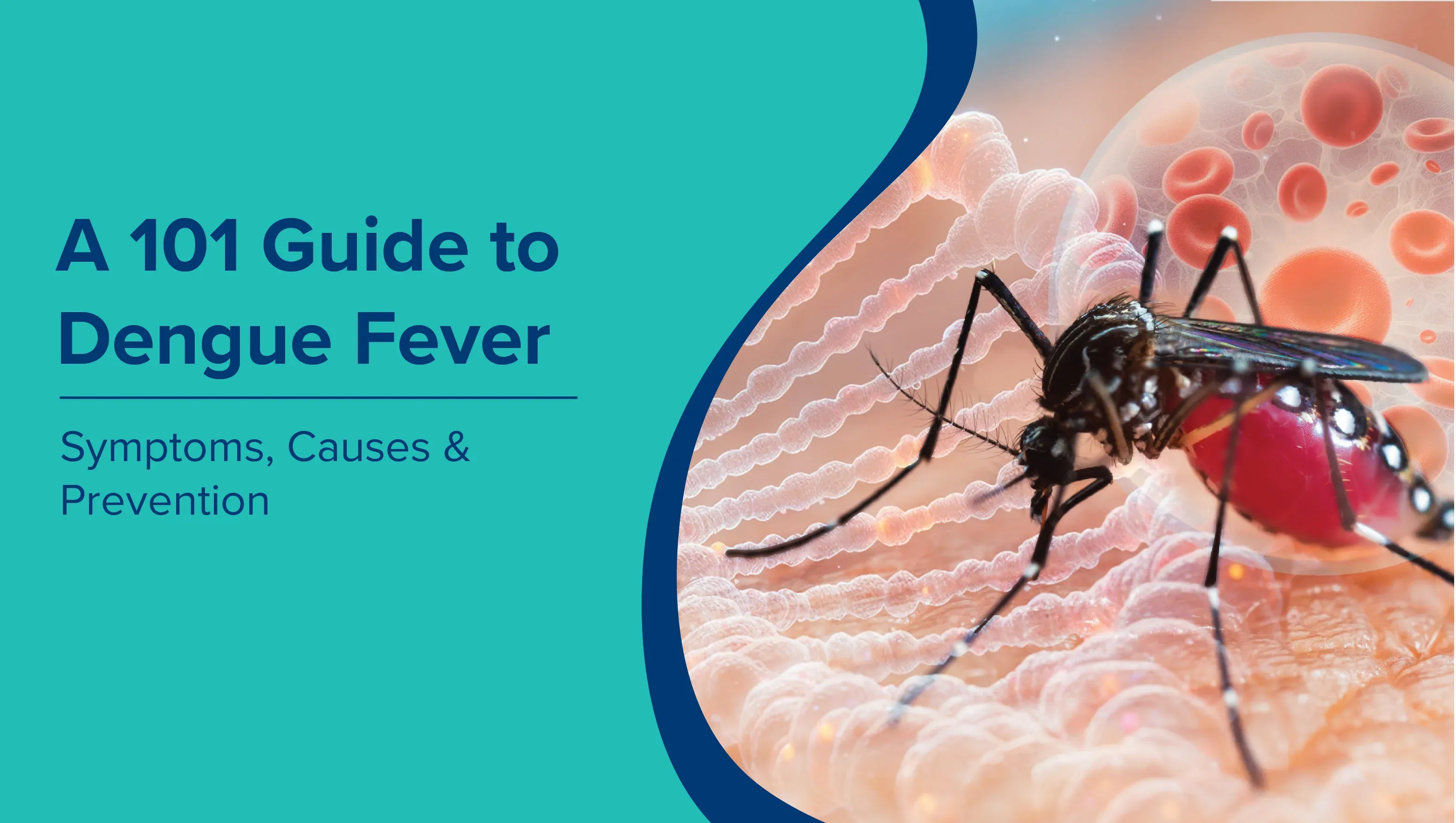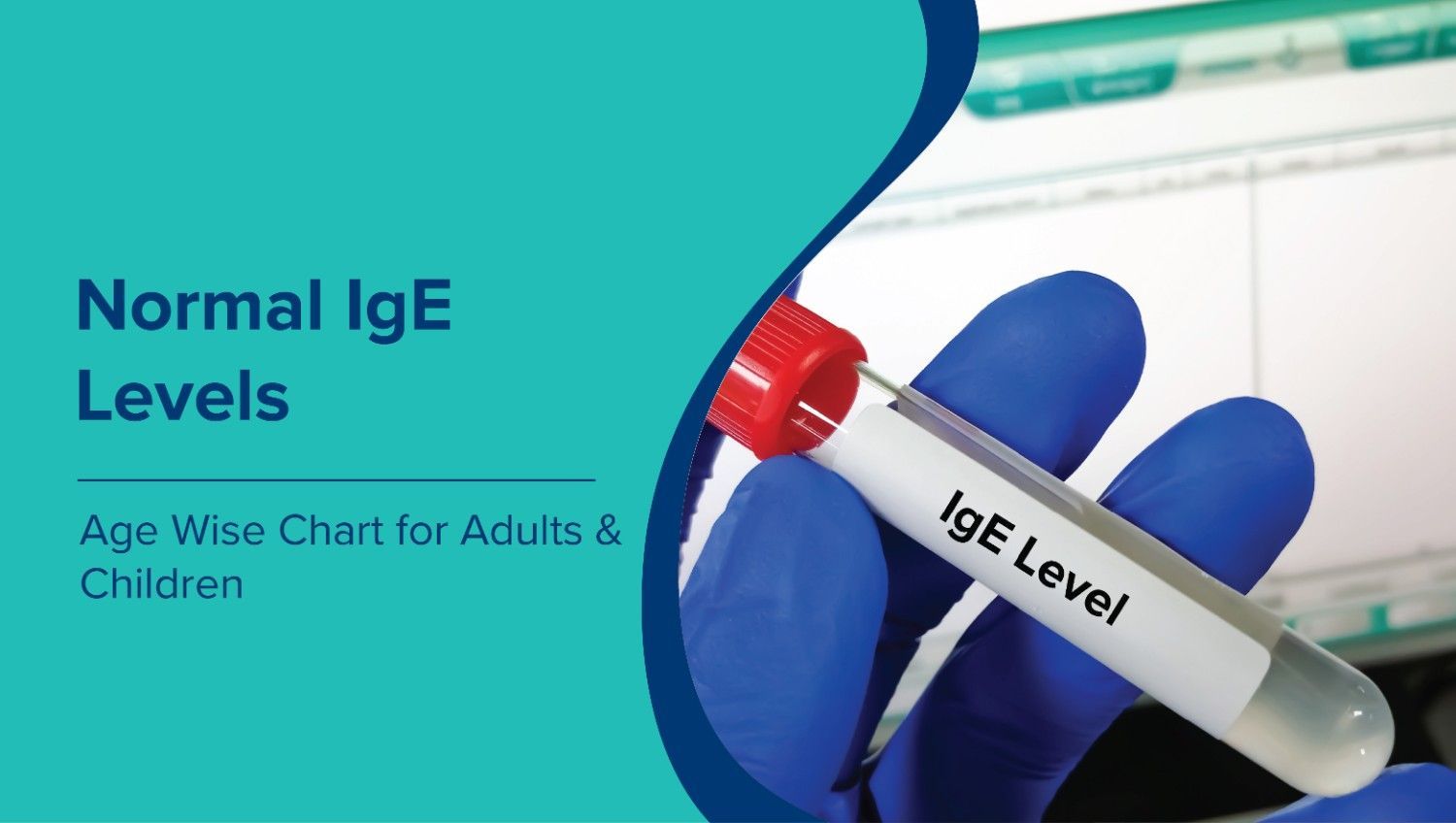Despite increasing awareness and the best efforts of authorities, dengue fever continues to be a pressing health issue in India, especially during the rainy and post-rainy seasons, when mosquito breeding is at its peak. The illness often starts with mild discomfort but can quickly escalate if not addressed early. Recognising the signs and seeking timely testing can make a significant difference in how the disease progresses. In this article, we break down the key symptoms, causes, complications, and preventive steps to help you stay informed and prepared. Let’s begin by understanding what dengue fever really is.
Understanding Dengue Fever
Dengue fever is caused by a virus that spreads through the bite of an infected Aedes aegypti mosquito. These mosquitoes usually bite during the day and breed in clean, stagnant water found in buckets, coolers, plant pots, and open containers.
The illness is common in India, especially during the rainy season, and can affect anyone. While many cases are mild and manageable at home, some can become severe if not diagnosed in time.
Types of Dengue Fever
There are four types of dengue viruses, and getting infected with one does not protect against the others. This means a person can get dengue more than once, and the risk of serious illness increases with repeated infections. Doctors usually classify dengue fever into four main types based on symptoms and how the body reacts to the virus:
Classic Dengue Fever
The most common form, marked by high fever, headaches, joint and muscle pain, and rash. Most cases recover with supportive care.
Dengue Haemorrhagic Fever (DHF)
A more serious type where blood vessels leak, leading to bleeding under the skin, low platelet count, and a risk of internal bleeding.
Dengue Shock Syndrome (DSS)
The most severe form, where blood pressure drops dangerously low. It can be life-threatening without urgent medical treatment.
Asymptomatic Dengue
Some people get infected but show no noticeable symptoms. Even without symptoms, they can still spread the virus to others via mosquito bites.
Early Symptoms of Dengue
The initial symptoms of dengue fever often appear 4 to 10 days after being bitten by an infected mosquito. These early signs may feel similar to viral fever or flu, which is why many people ignore them at first. Some of the first symptoms to watch out for include:
-
Sudden high fever (often over 101°F or 38.5°C)
-
Intense headache, especially around the forehead
-
Pain behind the eyes
-
Body aches and muscle pain
-
Tiredness or weakness
-
Mild skin rash
-
Nausea or feeling like vomiting
7 Warning Signs of Dengue Fever
While early symptoms may resemble a common viral illness, some dengue cases can become severe and require immediate medical attention. The following warning signs usually appear 3 to 7 days after symptoms begin, often when the fever starts to go down.
Here are the seven key warning signs of severe dengue:
-
Severe abdominal pain or persistent discomfort
-
Repeated vomiting, especially if it contains blood
-
Bleeding from the nose or gums, or easy bruising
-
Blood in stools or vomit
-
Rapid or difficult breathing
-
Extreme fatigue, drowsiness, or restlessness
-
Sudden drop in platelet count, often seen in blood test reports
Complications Associated with Dengue Fever
While many dengue cases are mild, the infection can sometimes lead to serious health problems, especially if not diagnosed or treated in time. Complications are more likely to occur in young children, the elderly, and those with a second dengue infection.
Possible dengue fever complications include:
-
Internal bleeding: May cause black or tarry stools, blood in vomit, or heavy menstrual bleeding
-
Dengue Haemorrhagic Fever (DHF): Leads to leaky blood vessels, low platelet count, and bleeding under the skin
-
Dengue Shock Syndrome (DSS): A dangerous drop in blood pressure that can result in organ failure
-
Liver damage: Seen in some severe cases, often indicated by elevated liver enzymes
-
Low platelet count: Increases the risk of uncontrolled bleeding
Causes of Dengue Fever and How it Spreads
Dengue fever is caused by the dengue virus (DENV), which enters the human body through the bite of an infected Aedes aegypti mosquito. These mosquitoes are most active during daylight hours, especially early morning and late afternoon.
Here’s how the infection spreads:
-
A mosquito becomes infected when it bites a person who already has dengue.
-
After a short incubation period, the mosquito can then transmit the virus to others it bites.
-
Dengue does not spread directly from one person to another. It only spreads through mosquito bites.
Environmental factors that increase the risk of dengue outbreaks include:
-
Stagnant water in containers, tyres, coolers, and rooftops where mosquitoes can breed
-
Poor mosquito control in homes, neighbourhoods, and public spaces
-
Warm and humid weather, which helps mosquitoes multiply faster
Understanding both the causes of dengue fever and how it spreads is key to prevention, especially during monsoon seasons when the risk is highest.
Dengue Fever Diagnosis
Dengue can be confirmed through simple blood tests that detect the virus or the body’s response to it. Early testing is important to track the illness and avoid complications.
Common diagnostic tests include:
-
NS1 Antigen Test: Detects the virus within the first 5 days of symptoms. It’s often the first test recommended for early diagnosis.
-
Dengue IgM and Dengue IgG Antibody Tests: These measure the body’s immune response. IgM appears early and indicates a recent infection, while IgG shows past exposure.
-
Complete Blood Count (CBC): Monitors platelet count, white blood cells, and haematocrit levels. A falling platelet count is a key sign of worsening dengue.
These tests help doctors confirm the stage of the infection and decide whether hospital care is needed.
Treatment for Dengue Fever
There is no specific medicine to cure dengue. Treatment mainly focuses on relieving symptoms and preventing complications. Most people recover at home with rest and proper care, but severe cases may need hospital support.
Key aspects of dengue treatment include:
-
Hydration: Drinking plenty of fluids like water, ORS, coconut water, or clear soups helps prevent dehydration and supports recovery.
-
Fever and Pain Relief: Paracetamol is usually recommended to manage fever and body aches. Medicines like ibuprofen or aspirin should be avoided, as they may increase the risk of bleeding.
-
Monitoring Platelet Count: Regular blood tests help track platelet levels and detect signs of internal bleeding or worsening illness.
-
Hospital Care (if required): In severe dengue, IV fluids, oxygen support, and close monitoring are essential. Some patients may need a short stay in the ICU.
Dengue Management at Home
For mild cases of dengue, home care plays an important role in recovery. With proper rest, fluids, and monitoring, most people begin to feel better within a week.
Here’s how to manage dengue at home:
-
Stay hydrated: Drink plenty of fluids, such as water, coconut water, ORS, and soups—to avoid dehydration.
-
Take paracetamol for fever: Avoid aspirin or ibuprofen, as they may increase bleeding risk.
-
Get plenty of rest: Allow the body to recover by avoiding strenuous activity.
-
Watch for warning signs: Monitor symptoms closely. If severe abdominal pain, repeated vomiting, or bleeding develops, seek hospital care immediately.
-
Use mosquito protection: Prevent further mosquito bites with repellents, nets, and full-sleeved clothing.
Dengue Fever Prevention
Since there is no vaccine for dengue widely available in India, prevention mainly focuses on avoiding mosquito bites and stopping mosquitoes from breeding.
Here are simple ways to reduce the risk:
-
Eliminate stagnant water: Empty and clean water from coolers, buckets, flower pots, and tyres at least once a week.
-
Use mosquito repellents: Apply creams or sprays containing DEET or other safe ingredients, especially during the day.
-
Wear protective clothing: Long-sleeved shirts, full trousers, and socks help reduce skin exposure.
-
Install screens and nets: Use mesh screens on windows and mosquito nets while sleeping, especially for children and elderly family members.
-
Keep surroundings clean: Avoid littering, and cover water tanks and containers to prevent mosquito breeding.
Why Choose MaxAtHome for Dengue Test
If symptoms of dengue appear, timely testing is essential to confirm the diagnosis and start proper care. MaxAtHome offers a safe and reliable way to get a dengue test at home, without the need to visit a crowded diagnostic centre.
Here’s why thousands trust MaxAtHome:
-
Home Sample Collection: A trained phlebotomist visits the home at the scheduled time for a quick and hygienic blood draw.
-
Accurate Results from NABL-Accredited Labs: Every sample is processed at certified labs to ensure precision and reliability.
-
Digital Reports Within 24–48 Hours: Test results are sent via WhatsApp, email, or accessible through the MaxAtHome platform.
-
Available Across Cities: Services are available in Delhi-NCR, Mumbai, Chandigarh, and other major locations.
Whether searching for a dengue test near me or simply wanting the convenience of home-based care, MaxAtHome brings expert diagnostic support right to the doorstep.
Book Your Dengue Test Today
Early testing is the first step to managing dengue effectively and avoiding complications. With MaxAtHome, there’s no need to travel or wait in queues, simply book a test from the comfort of home and get results you can trust.
Schedule the test online through our easy-to-use booking platform or call our team at 9240299624 to arrange a home sample collection at your convenience.
Frequently Asked Questions
Can someone get dengue fever more than once?
Yes. Since there are four types of dengue viruses, a person can be infected up to four times. The risk of severe illness increases with each subsequent infection.
How long does it take to recover from dengue fever?
Most people recover within 7 to 10 days with proper rest and hydration. However, fatigue can last a few more weeks in some cases.
Is there a vaccine for dengue fever in India?
Currently, there is no widely available dengue vaccine in India for the general public. Prevention through mosquito control remains the best strategy.
When should I get a dengue test after symptoms appear?
It’s best to get tested within the first 5 days of fever. The NS1 Antigen test is commonly used for early detection, followed by antibody tests if needed.
How is dengue fever different from viral flu?
While both may start with fever and fatigue, dengue is often associated with severe body pain, skin rash, and a drop in platelet count—features not typical of seasonal flu.
What are the risks of ignoring mild dengue symptoms?
Ignoring early signs can lead to delayed diagnosis. In some cases, the condition may worsen into dengue haemorrhagic fever or shock syndrome, which require hospital care.
Is it safe to book a dengue test at home?
Absolutely. MaxAtHome follows strict hygiene protocols and uses NABL-accredited labs, ensuring accurate results and safe sample collection.
What are the common signs and symptoms of dengue fever?
The most common signs and symptoms of dengue fever include high fever, severe headache, pain behind the eyes, body aches, skin rash, and fatigue. Some people may also experience nausea, mild bleeding, or low platelet count. In severe cases, warning signs such as abdominal pain, repeated vomiting, and difficulty breathing may appear, requiring urgent medical care.















